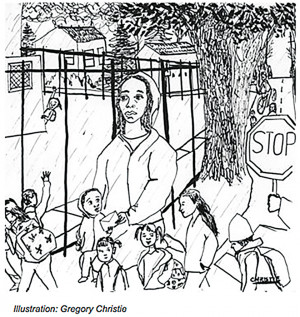A Letter From a Black Mom to Her Son
…For three years of my K-8 schooling, from 7:40 a.m. until 3:05 p.m., I was Black and invisible. I was bused across town to integrate a White school in Southeast Portland.
by Dyan Watson
Dear Caleb,

Caleb, I want your teachers to help you love being in your skin. I want them to make space for you in their curricula, so that you see yourself as integral to this country’s history, to your classroom’s community, to your peers’ learning. I want your teachers to select materials where Blacks are portrayed in ordinary and extraordinary ways that actively challenge stereotypes and biases. Most of all, Caleb, I want your teachers to know you so they can help you grow.
* * * *
Caleb, I hope that you will have teachers who realize they are gatekeepers. I hope they understand the power they hold and work to discover your talents, seek out your dreams and fan them, rather than smother them. I hope they will see you as part of a family, with gifts and rich histories that have been passed down to you. I hope they will strive to know you even when they think they already know you. I hope your teachers will approach you with humility and stay curious about who you are.
When I was in 4th grade, my school held a back-to-school night, which featured student work and allowed families to walk the halls and speak with teachers. In each classroom was a student leader, chosen by teachers…. At one point, a couple came in, desiring to speak with Mrs. S. She was busy so I thought I’d chat with them while they waited. As I approached them, they recoiled in fear and with a panicked look, turned away from me and said, “Mrs. S.?” My teacher looked away from the folks she was working with and said, “It’s OK, she’s not like the rest.” I don’t remember what happened next. All I remember is that this seemed to be one of the first in a long line of reassurances that I was special and not like other Black boys and girls. For many years afterward, I was told on more than one occasion, “You’re not like other Blacks.” This was supposed to be a compliment.
Caleb, I pray that your teachers will not look at you through hurtful racial preconceptions. I pray that they will do the work necessary to eliminate racist practices in themselves and in those around them. I pray that they stand up for you in ways that leave you feeling strong and capable. I pray that they will nurture your spirit, and that you, in turn, will desire to be a better you.
Son, I end this letter by sharing a story that Grandma has told me many times, that I hope will one day resonate with you. On the first day of kindergarten, many of the kids were crying and clinging to their parents. But not me. I was ready! I wanted to be like my three older siblings and go to school. I gave my mom a hug, let go of her hand, waved goodbye, and found my teacher. And remember how I told you that my oldest sister taught me how to read before I went to school? The teacher found this out and used this skill, along with my desire to be at school, to teach the other kids the alphabet and help them learn how to read. I believe, in part, that is why I became a teacher. She saw something in me and encouraged me to develop my passion—even at this young, sweet age.
That, my son, is my hope for you. I hope your teachers will love you for who you are and the promise of what you’ll be.
Love,
Mama
Dyan Watson, associate professor of teacher education and coordinator of secondary social studies at the graduate school, originally published the full version of this letter in her coedited volume Rethinking Elementary Education (Rethinking Schools, 2012). It was picked up by the Washington Post shortly after the tragic death of Trayvon Martin. Watson says, “For many folks of color, my letter is their letter.” Read more about Watson.
More L&C Magazine Stories
Lewis & Clark Magazine is located in McAfee on the Undergraduate Campus.
MSC: 19
email magazine@lclark.edu
voice 503-768-7970
fax 503-768-7969
The L&C Magazine staff welcomes letters and emails from readers about topics covered in the magazine. Correspondence must include your name and location and may be edited.
Lewis & Clark Magazine
Lewis & Clark
615 S. Palatine Hill Road MSC 19
Portland OR 97219

